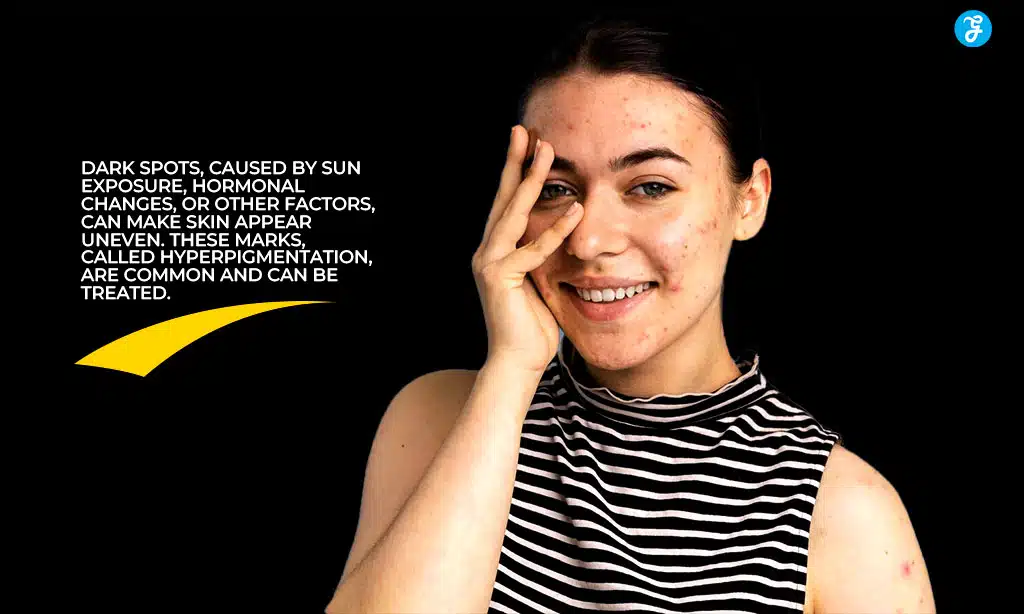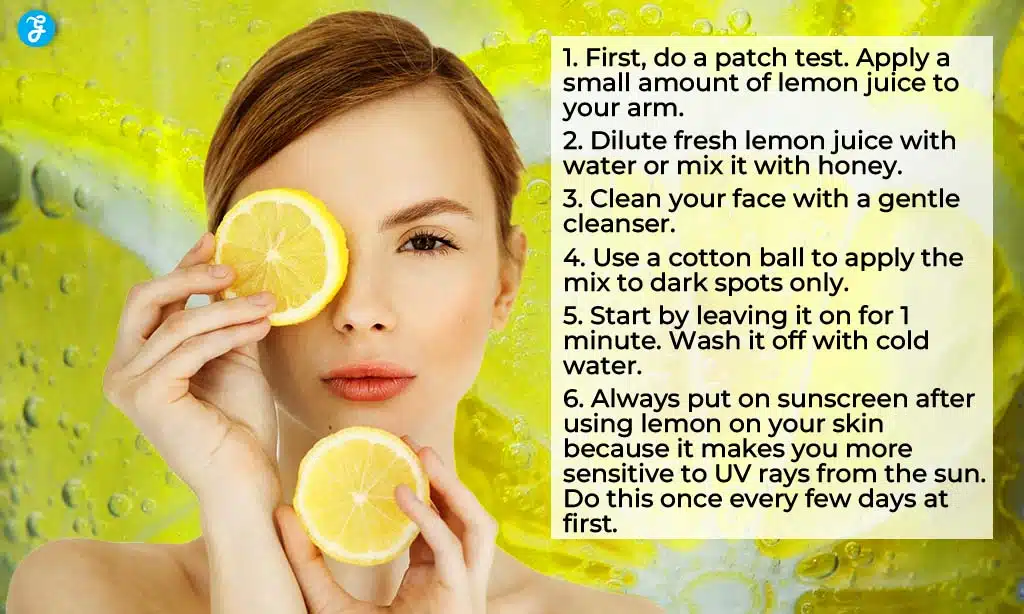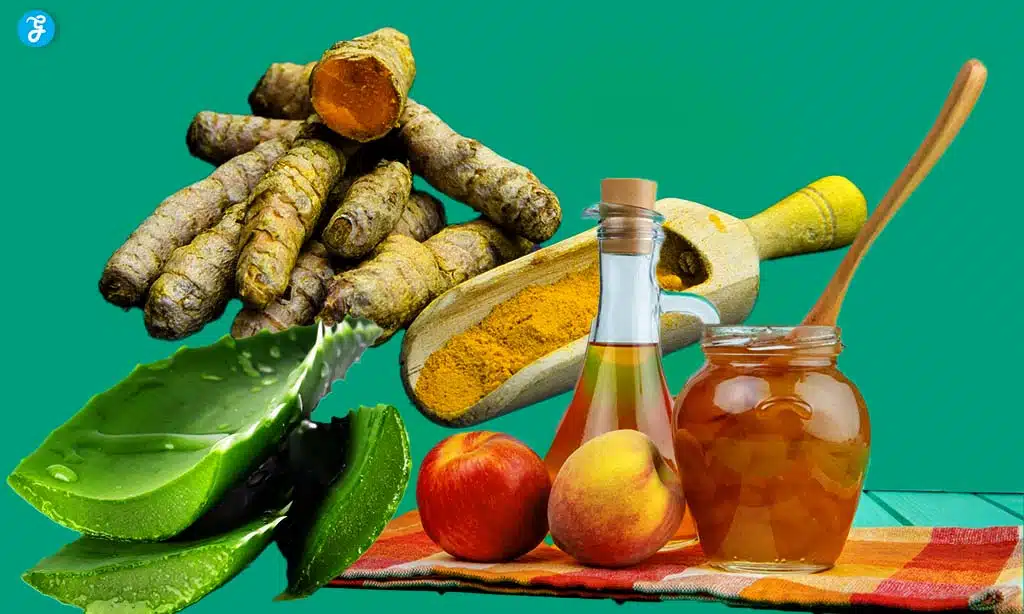Having dark spots on your face can make you feel self-conscious. You’re not alone if you’ve searched for ways to make those spots less visible. One popular method is using lemon juice, a simple kitchen ingredient that promises brighter skin.
The idea of using “wellhealthorganic.com : remove dark spots on face tang – lemon juice” has caught many people’s attention.
Lemon juice is rich in vitamin C, known for its skin-lightening properties. This fact helps us understand why it could be effective against dark spots, which form from things like too much sun or acne scars.
Our article will guide you through how to use lemon juice and other citrusy solutions safely and effectively to reduce these pesky marks. Keep reading — we promise helpful tips ahead!
Understanding Dark Spots on the Face
Dark spots on the face come from many places. Some are from too much sun, others might be left by skin breakout scars. These marks can change how our skin looks a lot. They make some parts of the skin darker than others.
This happens because something triggers our skin to make more melanin in those areas. Melanin is what gives color to our hair and eyes, too.
Common Causes
Several things can cause dark spots on your face. First, spending too much time in the sun or using tanning beds can damage your skin. This is called sun exposure. It makes dark spots appear because of too much light from the sun.
Next, changes in your body’s hormones can lead to melasma. This type of spot shows up when there are big shifts in hormones. Some medicines can also make dark spots form on your skin.
These include drugs for swelling, cancer treatment drugs, drugs to prevent malaria, and drugs to stop seizures.
Sometimes, if you get hurt or have a skin problem that swells up, it can cause dark spots as it heals. Also, using some cosmetic or hair products that irritate your skin might lead to these unwanted marks.
Lastly, certain health problems like diabetes might make areas of your skin darker than others.
Types of Hyperpigmentation
Hyperpigmentation makes parts of the skin darker. This happens when melanin goes up in some spots. There are different kinds. Melasma is one type. It comes from hormonal changes and shows as discoloration on the face.
Another kind is post-inflammatory hyperpigmentation. This often appears in medium to dark skin after injury or acne heals, leaving dark marks behind.
Age spots, also called liver spots, form on areas exposed to the sun like hands and face, mainly after age 40. Sunspots develop from too much time in the sun over years. Each type has its own causes and ways it looks on the skin, but all are due to an increase in melanin production leading to darker patches or spots on the skin.
Benefits of Lemon Juice for Skin
Lemon juice acts like a natural whitener for your skin. It is full of vitamin C, which helps make your skin brighter.
Natural bleaching agent
Lemon juice is a powerful tool for making skin light. It works like a natural bleach. This means it can make dark spots and acne scars less visible. Lemon juice has acid that helps with this.
Using lemon on your face helps get rid of dead skin cells, too. This makes your skin look brighter and smoother. Because lemon acts as an alpha hydroxy acid (AHA), it’s good at exfoliating the skin.
Rich in Vitamin C
Vitamin C is an antioxidant. It fights skin damage and signs of aging. This vitamin also helps make collagen. Collagen keeps your skin firm and smooth.
Using lemon juice on the face can give you these benefits, because it has lots of Vitamin C. Your skin will look better and feel healthier.
How to Use Lemon Juice and Tang for Dark Spots
To fade dark spots, mix fresh lemon liquid with a bit of Tang. Apply this blend gently on your face, then rinse off after some minutes for brighter skin.
Step-by-Step Instructions
Using lemon juice and tang can help lighten dark spots on your face. It’s simple if you follow these steps:
- First, do a patch test. Apply a small amount of lemon juice to your arm. Wait 24 hours. This checks for skin irritation.
- Dilute fresh lemon juice with water or mix it with honey. Use one part lemon juice and two parts water or honey.
- Clean your face with a gentle cleanser. Pat it dry with a towel.
- Use a cotton ball to apply the mix to dark spots only.
- Start by leaving it on for 1 minute. Wash it off with cold water.
- If your skin feels okay, try again next day. Leave the mix on for a bit longer each time, but no more than 10 minutes.
- Always put on sunscreen after using lemon on your skin because it makes you more sensitive to UV rays from the sun.
- Do this once every few days at first.
Following these steps will help ensure that you use lemon juice safely to fade dark spots on your face while caring for your skin properly.
Additional Tips for Maximizing Results
To get the best results from using lemon juice and tang for dark spots, you need to follow some extra steps. These steps help make sure your skin stays safe and you see better effects.
- Always do a patch test on your skin before full use. This helps find if your skin gets irritated by lemon juice.
- Mix lemon juice with a moisturizer or honey to reduce irritation. This blend keeps your skin hydrated.
- Use sunscreen every day, especially after applying lemon juice. Lemon makes skin sensitive to the sun.
- Apply lemon juice at night, not during the day, to avoid sun damage.
- Keep your skin care routine simple when using lemon juice. Don’t overload your face with other products.
- Wait for at least 20 minutes after applying lemon juice before putting anything else on your skin.
- Rinse off the lemon juice with cool water after it has been on your face for a few minutes.
- Be patient and consistent with the application; results take time.
- If your skin starts hurting or peeling, stop using lemon juice and see a doctor if needed.
These tips ensure that while trying to lighten dark spots, you do not harm your skin in the process.
Precautions When Using Lemon Juice
Lemon juice can make your skin more sensitive to the sun. Wear sunscreen or cover up when you go outside. It might also irritate some people’s skin, so test it on a small area first.
Sensitivity to sun exposure
Putting lemon juice on your skin makes it more sensitive to the sun. This means the sun can hurt your skin easier. If you go out in the sun after using lemon juice, your chances of getting a sunburn are higher.
It’s important to use sun protection like sunscreen. Look for one with a high SPF (Sun Protection Factor) to keep your skin safe from UV rays.
Also, try not to be in direct sunlight too much right after using lemon treatments on dark spots. Wearing hats or clothes that cover up can help protect your skin from solar lentigines and other types of damage caused by UV radiation.
This way, you’ll avoid harming your skin while trying to make it look better.
Skin irritation potential
Lemon juice can make your skin react in ways you might not like. It has citric acid, which makes the skin feel dry, turn red, or even start to peel. If your skin is sensitive, these effects can be stronger.
Doing a patch test first is smart. This way, you check if your skin gets mad at lemon juice before using it more.
Some people get a really bad reaction from lemon juice when they go into the sun. This problem is called phytophotodermatitis. Very rarely, it can also cause leukoderma – spots on the skin lose color.
So, using sunscreen and being careful with how much lemon juice you put on your face are key steps to avoid trouble.
Alternatives to Lemon Juice for Dark Spots
If lemon juice isn’t your thing, no worries. There are other ways to tackle those annoying dark spots.
Aloe Vera
Aloe Vera is a plant that works well for lightening dark spots. This plant has aloin, which can break down melanin cells in your skin. Melanin cells make dark spots. You need to get gel from an older Aloe Vera or buy pure gel from the store.
Put a thin layer of this gel on the spots before you go to sleep. In the morning, wash it off with warm water.
This natural remedy helps keep your skin tone even without harsh chemicals. Aloe Vera also soothes and heals your skin if you have sensitive skin or wounds. It’s full of antioxidant properties that help your skin look better over time.
Apple Cider Vinegar
Apple Cider Vinegar is an intelligent selection for combating dark spots. It contains acetic acid, which contributes to the lightening of pigmented areas. This can be conveniently utilized at home by blending it with water in equivalent proportions.
Immerse a cotton ball in the mixture and gently apply it to your dark patches.
Rinse this off your skin after 2-3 minutes. This approach is straightforward yet efficient in enhancing skin appearance. Be sure to proceed with caution and observe how your skin responds to determine the most effective method for you.
Turmeric
Turmeric is a spice that works wonders for the skin. It has curcumin, which fights inflammation and acts as an antioxidant. This helps reduce dark spots and evens out skin tones. You can make a paste by mixing turmeric with milk or honey.
Apply this paste to your face and leave it on for about 15-20 minutes before washing off.
A study shows using cream with turmeric can lessen hyperpigmentation by more than 14%. This makes turmeric a great choice if you’re looking for natural remedies to brighten your skin and fade dark spots.
Its antimicrobial properties also help keep your skin free from infections.
Takeaways
Freckles can be frustrating for some people, but using natural remedies like Tang and lemon juice might help lighten them and brighten your skin. Keep in mind that natural treatments take time to show results, so they’re not a quick solution.
It’s also important to protect your skin from the sun and stick to a good skincare routine. By following these steps and trying other natural remedies, you can improve your skin over time and work towards the look you want.







































